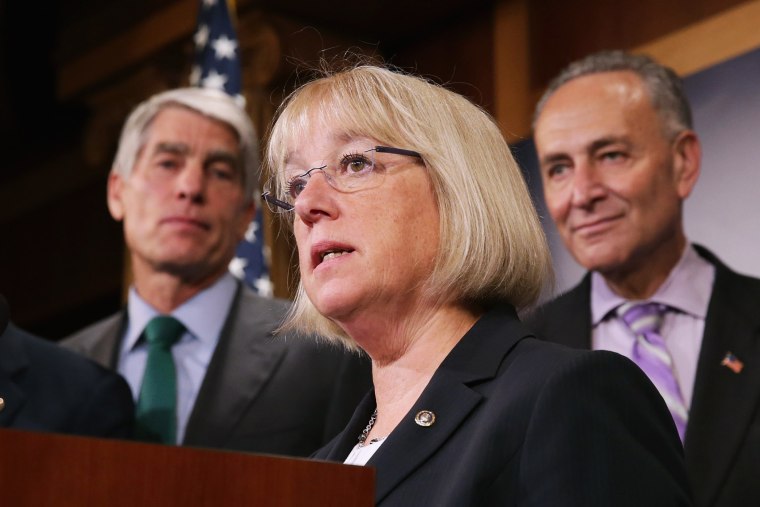With near unanimous Republican opposition to any action on climate change, a new memo by Washington Sen. Patty Murray reveals one way Democrats could change conservative minds: appeal to their wallets.
"This is not just an environmental issue," the Democratic senator and budget committee chairman argues in the memo, obtained by msnbc after it was sent to the Senate's Democratic caucus. "Climate change will also have serious ramifications for our economy and the federal budget, and failure to confront it will make it harder to meet our nation's long-term fiscal challenges.
Earlier this week, Murray held a hearing in the Senate budget committee about the impending costs of climate change, arguing that legislative inaction will ultimately cost more.
While Republicans have hamstrung legislative attempts to regulate emissions or mitigate the effects of climate change, President Obama has moved ahead with the announcement of a series of significant new Environmental Protection Agency regulations that would curb emissions by 30% over the next sixteen years. Republicans have staunchly opposed those measures, too, saying they are far too onerous on businesses, particularly the coal industry.
With Sen. Murray's memo, Democrats are hoping to put those economic concerns in perspective. A budget aide to Sen. Murray said they hope to cast a "wider net" argument by focusing on fiscal as well as environmental issues, with the end goal of building bipartisan support that includes fiscal conservatives.
The memo focuses on the budget because "we're hoping this will be a persuasive argument for both sides," she added, noting that infrastructure and disaster relief -- two climate-related issues the memo addresses -- often earn bipartisan support in budgets.
The memo outlines four key ways climate change will cost the country: disaster relief from extreme weather, transportation and water infrastructure, national security and agriculture.
“Left unabated, climate change will result in more frequent and intense episodes of extreme weather, like the kind we saw during Hurricanes Katrina and Sandy,” Murray wrote in the memo. She noted that the country has spent three times as much on disaster relief in the last decade than the one before.
While disaster relief is typically approved by Congress quickly, conservatives opposed last year's funding for Hurricane Sandy relief because there weren't budgetary offsets; Murray's memo notes that such situations are likely to become increasingly common as climate change continues. Worsening droughts will also likely blow holes in federal budgets for nutritional assistance and crop insurance as climate change worsens.
Murray’s plea to her caucus comes on the heels of the president’s own report detailing exactly how much climate change is expected to cost -- $150 billion a year.
"They're very much compatible," the Murray aide added.
Murray's Republican counterpart in the House, Wisconsin Rep. Paul Ryan, rebuked the Democrats' efforts at an event earlier this week where he condemned the president's new EPA regulations.
“Climate change occurs no matter what,” he said, according to The Hill. “The question is, can and should the federal government do something about it? And I would argue the federal government, with all its tax and regulatory schemes, can't.”
“I don’t see a solution here,” he continued. “I see an excuse to grow government, raise taxes and slow down economic growth.”
